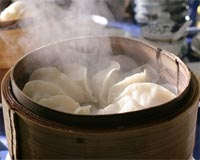 |
Qixingcun, China (AFP) March 29, 2010 Peasant farmer Dong Guicheng wakes up every morning hoping for rain, but each day a crippling drought instead brings more disappointment and desperation. In a scene repeated by millions of people in a vast area of China's parched southwest, Dong treks daily to a dwindling reservoir to fetch scarce water for his walnut and chestnut trees, which have seen almost no rain for half a year. His family has barely enough to drink, he hasn't bathed for weeks, and Dong says the damage to his crops could cut his earnings by 80 percent this year. "I am very worried," Dong said, as he and his wife Dao Haiyan filled a rusty tank with water from a dwindling reservoir in Yunnan province before carting it to their home two kilometres (one mile) away. "If there continues to be no rain I will have no income. The impact has been too big for words," he said, shaking his fist skywards. The drought plaguing Yunnan, Guizhou and Sichuan provinces, the Guangxi region and the mega-city of Chongqing has been called the worst in a century. It has devastated crops, fuelled price rises and highlighted China's chronic water problems. Since last September, rainfall has been less than half the normal levels, turning much of normally temperate Yunnan into a bone-dry environmental disaster zone of evaporating reservoirs and shrivelled rivers. Terraced fields that should be bursting green with winter crops instead resemble dusty deserts, their normally rich soil hard as rock. Everywhere in the countryside, men and women in conical hats carry precious water in buckets balanced on bamboo poles across their shoulders, often for long distances. The government says more than 60 million people are affected, with more than 18 million people and 11 million livestock short of drinking water -- numbers that grow daily. Sudden shortages of economically vital sugar, rice, tea, and fresh flowers have driven up prices, and the drought zone's rich hydroelectric resources are dwindling. State media this week said 90 percent of hydropower stations in the worst-hit province, Guizhou, were paralysed. This comes just as the government is struggling to rein in inflation and prevent it tripping up the country's robust economic recovery. While the full economic damage remains to be seen, with the government already putting direct losses at nearly three billion dollars, the human impact is clear. In Yunnan alone, hundreds of reservoirs vital to rural communities have dried up or will do soon, state media have said. Tap water is cut off in many areas and illnesses have been reported as thirsty villagers drink unsafe reservoir water. The state media have been full of stark images of desperate villagers sitting amid the cracked beds of dried-up reservoirs. China has dealt for millennia with the alternating curses of drought and flood, but the severity of this dry spell is on everyone's lips. "I'm 64, and this is the driest I have ever seen it," said Cai Yichang, a farmer who lives near the Yunnan city of Yiliang. Scanning sand-coloured terraced fields that should be green, Cai has had to plant a smaller crop of onions and has been unable to plant his spring corn, a blow likely to halve his roughly 20,000 yuan (2,900 dollar) annual income. "My biggest fear is that if it continues to be so dry, the impact on the harvest will be severe," he said, in between drags of tobacco on a large water pipe. Meteorologists say the drought could last until June or beyond, and a massive effort to trigger rain with cloud-seeding chemicals has failed to break the dry spell due to a lack of moisture in the air. The government says it has rushed drinking water to the region, launched emergency water diversion projects and dug thousands of wells. But the impact on the ground has been as negligible as the rain, said Dong. "The government? They haven't taken any measures. We just have to rely on ourselves to take the water to the fields," said Dong, whose troubles are compounded by rising vegetable prices, which he said had more than doubled. China's state meteorologists have blamed an increase in the number of extreme weather events in recent years on climate change. But the drought has been intensified by massive deforestation and the pollution and depletion of water resources caused by China's heady pursuit of economic growth, said Ma Jun, author of "China's Water Crisis". "There is such a tight eco-balance now that whenever we have a problem with a natural climate phenomenon, it causes a big disaster. We don't have much extra capacity to absorb the impact," he said.
Share This Article With Planet Earth
Related Links Farming Today - Suppliers and Technology
 Bitter taste in Japan over China's poison dumpling arrest
Bitter taste in Japan over China's poison dumpling arrestTokyo (AFP) March 28, 2010 Japanese media voiced suspicion Sunday about Beijing's motives after China announced the arrest of a factory worker accused of poisoning frozen dumplings destined for Japan. The arrest came two years after Tokyo first pressed Beijing to investigate the case of the pesticide-tainted dumplings that made 10 people sick in Japan, including a small child, triggering a row between the two neighhbo ... read more |
|
| The content herein, unless otherwise known to be public domain, are Copyright 1995-2010 - SpaceDaily. AFP and UPI Wire Stories are copyright Agence France-Presse and United Press International. ESA Portal Reports are copyright European Space Agency. All NASA sourced material is public domain. Additional copyrights may apply in whole or part to other bona fide parties. Advertising does not imply endorsement,agreement or approval of any opinions, statements or information provided by SpaceDaily on any Web page published or hosted by SpaceDaily. Privacy Statement |